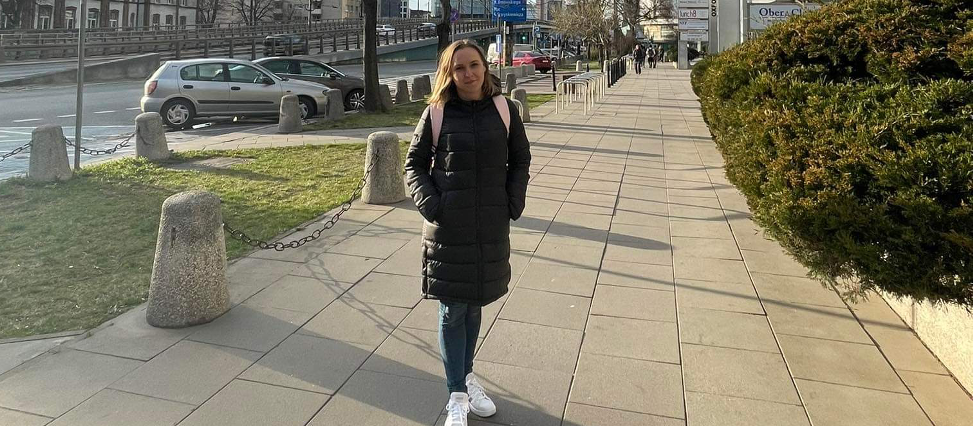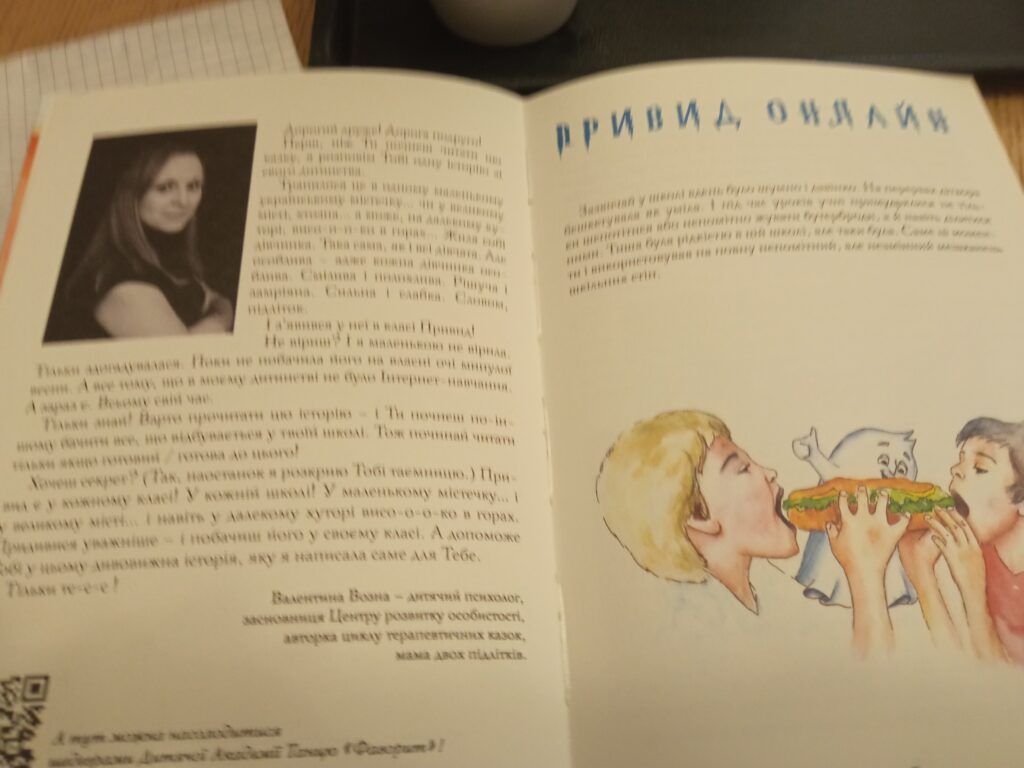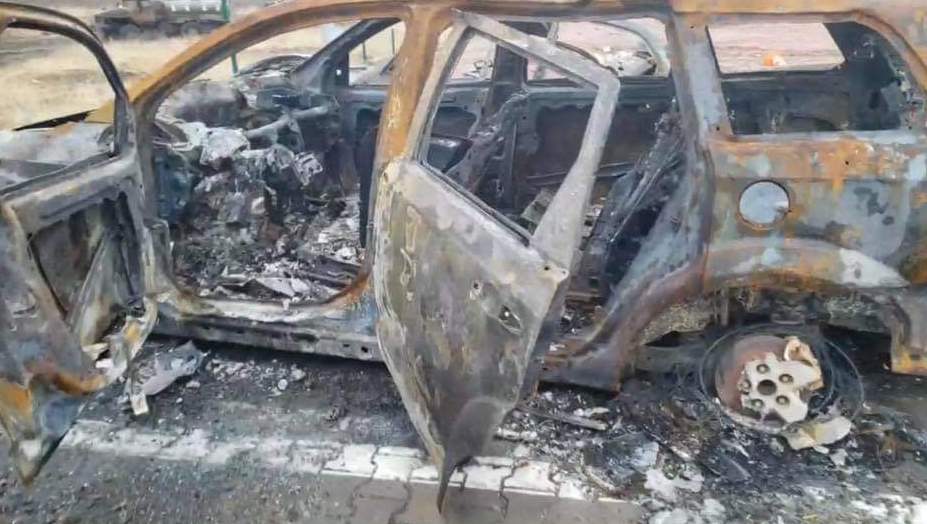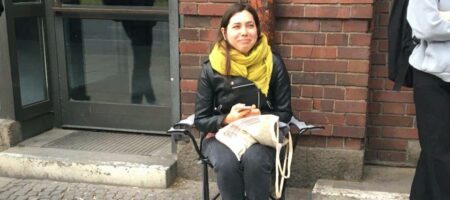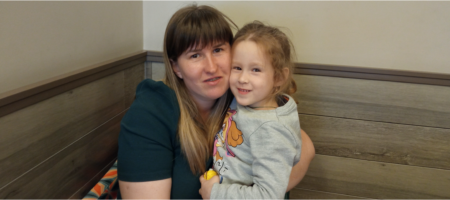Valentyna looks at three books laid out on the table before her. She’s a writer and these are the only records of her literary achievements that survived her escape from Ukraine.
Looking calm and thoughtful, Valentyna prepares to tell her story.
A mother of two teenagers, Valentyna lived with her children in Obuhiv, a small town near the city of Kyiv in Ukraine. She is a psychologist and psychotherapist for children and owned and ran a centre for psychologically disabled children. She’s published many therapeutic fairy tales and poems for children, too. Her work gave her a great sense of purpose and meaning and she was excited about her future plans: publishing new books, presenting at events and developing her business.
Valentyna describes her own children – a 16 year-old son and a 13 year-old daughter – as her life and inspiration. Family life was completely happy and satisfying and she enjoyed giving her time and attention to her kids: helping with their studies, taking them to sporting events and travelling together. Her son is a karate instructor and her daughter is a professional dancer.
The most important thing is the safety of my children.
For Valentyna, the situation in Ukraine seemed very tense and stressful long before the war started. She planned to take her children to a safer location in west Ukraine and they were due to leave on February 24. That morning, Valentyna woke up at 4.50am to the terrifying, booming sound of bombing. The neighbouring town of Vasylkiv, which was just 10km from her home, had been hit. There were four powerful explosions in total.
I understood in my mind that it was war, but to realise it and to believe that it was really happening was totally impossible.
The first thought that struck Valentyna was that she had to gather all the necessary things and run with her children. She called her family – her parents, her sister and her nephew – who lived in Kyiv, and arranged to go there right away. When the family were together, all seven of them got in one car and started to drive.
The whole journey from Kyiv to the Polish border was one huge traffic jam.
It took the family three-and-a-half days to travel from Obuhiv to Poland, passing through Lviv. Near to the border, their car broke down and they had to leave the belongings they couldn’t carry – including Valentyna’s collection of her published books – and abandon it. It took them two days to reach the border on foot. They didn’t have a place to sleep and everyone was utterly exhausted. Usually energetic and happy, the children were very quiet and reserved. Finally, with the exception of Valentyna’s father, who returned to Kyiv, the family crossed the border at Krakovets and were met by volunteers. The volunteers were doing everything they could to warm people up and provide them with food and drinks, and many Polish families were present, just sharing out belongings and food from their homes.
I’m so grateful to every person who came to help Ukranians on the border because I know that they did it with heart. They are heroes.
The process of actually crossing the border wasn’t yet very organised. Valentyna was among the first wave of refugees and no one was exactly sure how things should best work. There were crowds of people, including men, trying to leave Ukraine and the women and children were pushed out of the way. Some people were passing their children overhead from hand-to-hand.
It just looked like real hell.
The family had friends in Poland who met them on the border and took them to their home in Katowice. Valentyna remembers that it was a grey day and everything seemed quite unfriendly and gloomy.
Poland has always been so culturally close and familiar to Ukraine, but that day everything looked like a military movie.
When Valentyna’s father, on his route back to Kyiv, passed the family’s abandoned car, he discovered that it had been shot at and completely burnt out. Valentyna’s books did not survive the journey – but at least the family did.
When they arrived at the home in Katowice, however, the gloom lifted. Everything was ready to accommodate them, they could eat fresh home-cooked food and rest. They still stay with their friends in Katowice now.
As a psychologist, Valentyna believes that, despite the complete disruption, it’s so important to remove children from the environment of war. She stresses that this will have a huge impact on future generations.
If we try our best to reduce the psychological trauma for our children, it will have less of an impact on theirs.
Valentyna is working in Krakow, as a psychologist for Ukrainian children who have been traumatised by the war, in a private centre. After her formal work hours she continues to volunteer for those who need support. She tries to help everyone who asks for it and so her days are full – from early morning to late evening – and that’s her way of coping with the stress.
Recently, Valentyna has completed a new therapeutic fairy tale for Ukrainian children. She is making the most of things, but she looks forward to returning to her hometown and the work that she adores. She finds not being able to envisage the future very difficult.
Everything that is happening seems to me like a grey concrete wall. I don’t see the future.
She tries to resist making plans for the future and lives day-by-day, just trying to do her best. Valentyna can already see how the hard experience of war has changed her: she is not so afraid now, she feels more emotionally sensitive, and more confident, and yet she carries less self-pride. Her life has been turned upside down and she does not believe it will ever be the same again.
Many people are going through changes to their worldview now. I think now the question of humanity is at the front of everyone’s minds – and Ukraine is the country fighting for that.
Valentina says she will never forget the feeling of terror when she realised that bombs were falling and her children weren’t safe. But on a positive note, she will also remember how people helped and supported her family.
The war has helped me to understand who my real friends are – and who they are not.
Posted on April 23rd, 2022
Voices Ukraine

